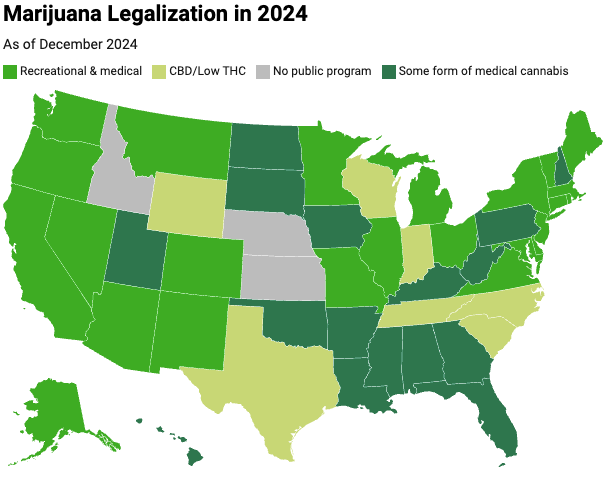Our Weird Drug Laws
Federal and state marijuana policies are wildly out of sync.

AP (“One state has a shortage of marijuana and its neighbor had too much. Here’s why.“):
Marijuana retailers in Connecticut say a dearth of licensed growers in the state’s fledgling legal pot industry has left them with a shortage of product to sell.
The supply problem has appeared after slow retail growth in neighboring New York last year left growers there struggling with the opposite: an excess of supply.
This would seem to be the most simple of economic problems but, alas, the free market can’t operate here.
It would seem both problems could easily be solved by shipping product a few miles over state lines. But that would violate federal drug laws. So each state that legalizes marijuana is left with its own process for licensing growers and sellers, and trying to create a balance between the two within state borders.
Benjamin Zachs, the chief operating officer of Fine Fettle, which operates five dispensaries in Connecticut, said he worries that low supply in stores is leading some customers back to their former, illegal dealers, and across state lines where he cannot go to get product.
According to a recent analysis by the National Conference of State Legislatures, only Idaho, Nebraska, and Kansas have no allowance for legal use of marijuana at all. In most of the country, recreational use is legal. An pretty much everywhere else allows medical use:

And, yet, it is still a Schedule 1 drug and illegal to use, sell, or transport under Federal law. (The Biden administration is recommending re-classifying it as a Schedule 3 drug, but it hasn’t happened yet.) Which leaves us with a farce of a public policy, where people are openly breaking Federal law across the country—including in public view—with no enforcement except at margins like mass transport across state lines.
Additionally, its federal designation makes things really challenging for the licensed businesses to bank and do things like get insurance. That also destabilizes the industry further.
This a good example of how primaries incentivize inaction in Congress. While it is quite clear that marijuana legalization is broadly popular, members of Congress don’t want to run in primaries when small, vocal minorities who could punish them during the re-nomination process. Easier to just avoid controversial matters altogether (especially when the states are doing the hard work for Congress, even if in a piecemeal fashion that is inconsistent for American citizens).
@Steven L. Taylor: huh, I wonder then what happens when you combine that challenge with uncompetitive districts.
It’s almost like the promise that our system allows us to vote out lawmakers whose actions disappoint us doesn’t actually work with large and there is little actually punishment for dysfunction.
@mattbernius: Funny how that works…
It’s very hard to get Americans to move beyond the Puritanical instinct to punish pleasure.
I am pleased to report that I was always able to find many, many varieties of weed in California, and now, in Vegas, there are about as many dispensaries as there are Starbucks, and with plenty of options. The business isn’t going away for the same reason that it didn’t go away when it was illegal: willing seller, willing buyer, capitalism 101.
@Michael Reynolds:
Slight build @MR, it’s “the Puritanical instinct to punish” full stop. Yes, pleasure is punished, but so to are other transgressions–even more so. And start to compare our punishment guidelines to other countries and many people will start to defend our harsher sentences as the right way to go.
Or, probably most accurate “the Puritanical pleasure of punishing.”
@mattbernius:
None dare call it sadism.
@Michael Reynolds:
The lust that dare not speak its name.
I was a short-haired teen when Nixon announced the “War on Drugs.” Even then I thought it was an incredibly stupid idea. IIRC, my original proposed thesis was on the lines of “Cost/Benefit Analysis of the Legalization and Taxation of Illegal Pharmaceutics.” My advisor suggested that I was “maybe” thinking in terms of Demon Weed, and was appalled when I responded that no, legalize it all, sell it all at the liquor store (Washington, State Liquor Board controlled monopoly), and tax the living beejesus out of it. Controlled strength, purity, quality, just like prescription drugs. I was told that this would result in the complete destruction of society, to which I responded, “Oh, you mean like legalization of liquor post-Prohibition?”
When I was in chemotherapy, at one point I was on 14 different drugs at home.
8 of them were various anti-nausea drugs to be taken at various times in my treatment. My oncology team had better luck with THC, but the random nature of what was available at that time were a huge problem. That, combined with the fact that marijuana use is a red-line cause for loss of federal benefits (i.e., Medicare/Medicaid).
I still giggle every time I go by my local senior community where the cop shop shares a parking lot with a ginormous pot/edibles Mega Mart.
But in the meantime, as Laugh-In commented 50 years ago, I’d like to compliment Drugs for their resounding victory in the War on Drugs.